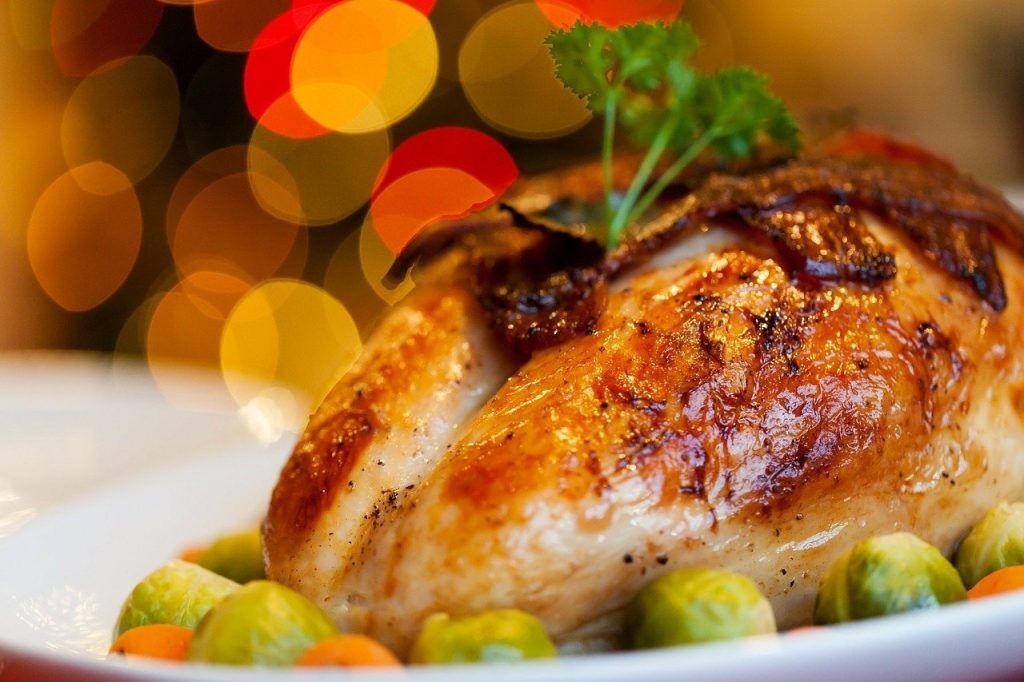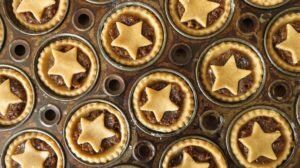
How Many Calories Are Consumed on Christmas Day?
In 2016, a study by Wren Kitchens found that the average British person consumed almost 6,000 calories on Christmas day. This is quite an amazing stat, and it was covered by several newspapers. But how accurate is it?
In this article, we will talk about that study, and what it means for you this Christmas. Should you care? Are there ways to save calories? What about the rest of the festive period?
 Average Calories Consumed on Christmas Day
Average Calories Consumed on Christmas Day
5,905 calories are a nice easy answer to the question. But there are several things that are not being said here. How big was the study? How did they work out the calories? Why is Wren Kitchens doing studies on Christmas calories in the first place?
The most likely explanation is that Wren Kitchens asked 100 people what they ate at Christmas, then worked out all of the calories for them.
The problem is that people are pretty terrible at estimating how much they eat each day. Forgetting snacks, overestimating, or underestimating portion sizes, and often omitting food as they don’t want to appear greedy.
This means that the calorie estimates given may well be way off! The good people at Wren Kitchens are almost certainly not trained scientists or nutritionists, so how much can we trust their interpretation of the results?
Another issue is sample size. We have no idea how many people were asked about their diet on Christmas day. Maybe it was 100 people? Maybe it was 10,000? Maybe it was a quick whip round of the office?
But this matters a lot. Do vegans consume as much? What about women in their 70s? What about young men in their early 20s? Do teetotallers consume the same as drinkers? Probably not.
This is not an attack on Wren Kitchens by the way, their study was clearly a bit of fun. But it is unlikely to be that accurate and should not be treated as such.
6,000 calories seem like a very high number, and we’re sure that many people consume that much. But as an average? It seems unlikely, and there will be a huge proportion of the country who don’t consume anywhere near as many calories as that!
 Should You Worry About How Many Calories You Consume on Christmas?
Should You Worry About How Many Calories You Consume on Christmas?
This is a tricky question to answer. On the one hand, it’s Christmas, if you can’t throw the diet out the window on that day, when can you? On the other hand, 6000+ calories are a LOT.
It is no secret that most people gain weight over the holiday period, and it is one reason why so many people go gym-crazy in January. Christmas day is a traditional feast day in the UK and has been for centuries.
The problem is rarely Christmas day itself; the problem is the entire festive period. If Wren Kitchen had done a study on the entire month of December, that would have provided some useful insight into the actual problem.
Christmas parties, Christmas eve, Christmas day, Boxing day, that period between Boxing day and New Year’s Eve where it is acceptable to eat a Terry’s Chocolate Orange for breakfast, and then there’s New Year’s Eve/Day.
If you are consistently consuming 2-3 times your recommended calorie intake for that two week period, then you are going to see some weight gain.
Everyone knows this already, it’s just up to you whether it’s worth it or not. Eating chicken, rice and broccoli on Christmas day should of course be illegal, but that’s just our opinion.
 How to (Slightly) Reduce Calories Around Christmas
How to (Slightly) Reduce Calories Around Christmas
While you may not want to follow a diet on Christmas day, the idea of 6,000+ calories might give you a moment’s pause. So here are a few tips to lessen the calorie total.
Agree a Zero Snack Present Pact
Stop giving people packs of chocolate and sweets for presents. On a day where everyone is going to be eating more than they should, why wrap up an extra 200-500 calories as a gift? Nobody is ever excited to unwrap a box of chocolates in any case.
Stop Eating After 8pm
You’ve had your breakfast, you’ve had your Christmas meal, and you’ve probably had a buffet in the evening. So, you’re unlikely to be hungry again. Any food eaten after those meals is pointless. You won’t appreciate it as much because you’re full, it will make it harder to sleep, and these are just unneeded calories.
Don’t Provide a Starter
Christmas dinner is basically an extra large roast dinner for most people, so why have a starter? It’s a lot more effort to cook, it adds even more to the cost of the meal, and as you’re about to eat a massive meal anyway it is just useless calories.
Go for Turkey
Turkey is the traditional Christmas bird, it is also the lowest calorie option, and one of the best protein options too. Goose and duck are becoming more popular, but they are much fattier, and therefore they will contain more calories. Considering that whatever you eat at Christmas dinner is going to be covered in gravy, bread sauce, and cranberries you’ll barely notice the difference!
Avoid the Bacon Wrapped Sausages
Just kidding! We’re not monsters.
Final Thoughts
Deciding whether to stay somewhat sensible or go all out for Christmas is a judgement call that only you can make. It is definitely possible to have a great Christmas while consuming fewer than 6,000 calories. But you don’t want to be spending your day weighing mince pies and scanning barcodes.
On the other hand, waking up on January 2nd with a raging hangover and an extra inch of fat is not much fun. Striking a balance between the two is probably your best bet.
Accept that some weight gain during the festive period is inevitable, but try to reign yourself in where possible. That way you’ll have a great Christmas and you won’t have too much catching up to do in January.


 Average Calories Consumed on Christmas Day
Average Calories Consumed on Christmas Day Should You Worry About How Many Calories You Consume on Christmas?
Should You Worry About How Many Calories You Consume on Christmas? How to (Slightly) Reduce Calories Around Christmas
How to (Slightly) Reduce Calories Around Christmas
No Comments yet!